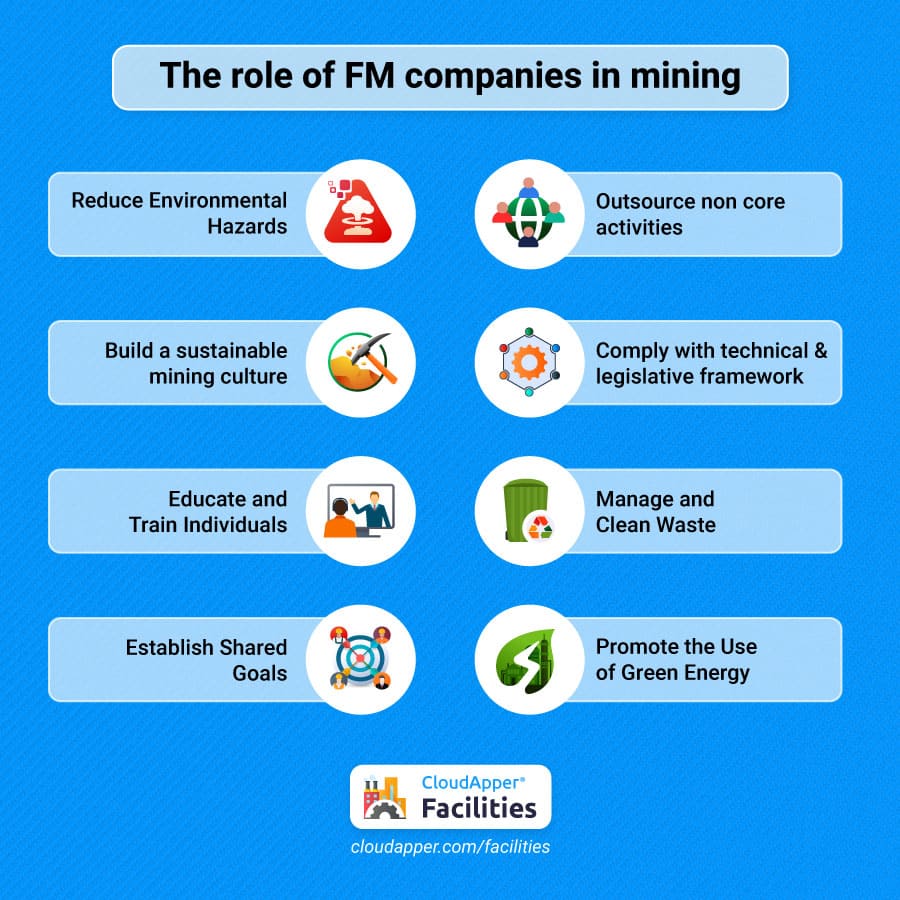According to Technavio, a research company, the worldwide mining waste market is predicted to rise from 68.76 million tons in 2017 to roughly 87 million tons by 2022. South Africa is estimated to account for 10% to 13% of the market. In layman’s words, the country’s mining waste is expected to increase from an estimated 8.9 million tons in 2017 to around 11.3 million tons by 2022.
Access to energy, high pricing, and energy shortages are just a few of the issues that mining faces. Mining may also harm people and the environment, having a detrimental influence on health and safety and the commercial viability of projects, security, and commodity prices.
How does facilities management companies play a part in mines?
The Facilities Management (FM) industry may play a unique role in reducing inefficiencies in mining operations. The FM sector may support infrastructure development, asset management, and business support services. Suppose you work for an FM service provider. In that case, you should endeavor to develop and implement solutions to lessen the negative environmental consequences of mining, support efforts to promote employee health and well-being, and support efforts to restore ecological sustainability. Everyone involved in the mining value chain has a role to play in enhancing the environment and the lives of those who live in the mining ecosystem.
FM companies can assist in reducing a variety of environmental hazards in the mining industry, such as radioactive materials contamination from density gauges and mineral analysis equipment, wet waste (chemicals, leachate, effluent, and so on), gas emissions, glass, and manufacturing waste, and radioactive materials from density gauges.
Recently, there has been a lot of focus on building a sustainable mining culture and processing minerals in an energy-efficient manner. The mining sector can continue to develop if everyone in the mining ecosystem, from earth-moving businesses to catering and waste management, adopts environmentally friendly practices.
FM companies must ensure that their waste management procedures do not transfer garbage to landfills or that their partners do if that function is outsourced. They also have an ethical obligation to educate and train individuals to be more environmentally conscious.
While there is still a lot of mistrust in the labor market regarding outsourcing due to the opposing aims of employers and organized labor, professional service providers can establish shared goals and make them work together uniquely. This is something that every excellent FM company should be able to achieve.
There is a need for organized labor to adjust its view on outsourcing and recognize that outsourcing non-core tasks are a growth requirement for companies that wish to preserve jobs. Outsourcing corporations, like mining companies, recruit workers from the labor market to assist them in addressing their difficulties. They accomplish this by employing people to work for them.
While metals and minerals are critical to the infrastructure and technology required to accomplish the Millennium Development Goals, it is equally essential that these resources be produced and utilized to improve the human condition. Strategic partnerships with competent FM providers who understand the industry’s legislative framework, the safety, and environmental requirements to protect and extend life, the technical competence, organizational capacity to do their job, and the business sense to help the economy grow are critical.
Facilities Management service providers must submit specific reports on managing waste in terms of quantities and waste streams. They must ensure that they play a role in making the world a better place by avoiding waste. When Clients utilize waste management systems at their facilities, it provides confidence and the opportunity to monitor how successfully they accomplish their triple bottom line goals and their legal and regulatory duties.
A group discussion should be held to consider how to reduce the usage of fossil fuel energy sources in energy-intensive mining operations and how to employ carbon-neutral energy sources and co-generation.
Digital transformation should be embraced by everyone working in the mining industry. This will aid in mitigating the consequences of global warming. In reality, many facility management service providers desire to deploy facility management software in the mining industry. As a result, the requirement for technology and process advancements will push the worldwide mining waste management market to expand globally.
Why mining is important
The Institute of Race Relations published a study in March 2019. It examines, among other things, the local mining sector, how it has struggled in recent years, how much it contributes to the GDP, and how it may be revitalized. South Africa’s GDP (gross domestic product) increased by 3.1 percent in the second quarter of 2019. The mining and quarrying industry rose by 14.4 percent and contributed 1 percent to GDP growth. Production of iron ore, manganese ore, coal, and other metal ores such as platinum increased.
Mining is still an important sector that has a significant economic effect and is essential to the achievement of both businesses and communities. As a result, it should be in everyone’s best interests to assist the sector in growing in a healthy and long-term way.




















